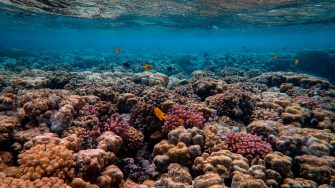
Overview
The UNSW Coral Reefs and Climate Change (MSCI2060) course examines one of the world’s most diverse and important ecosystems: tropical coral reefs. With an increase in carbon dioxide levels over the last few decades, the planet has seen mass bleaching events and unprecedented levels of coral mortality. In this course, you’ll explore how our changing climate affects corals and what measures we can take to manage and conserve these coral reefs.
This course looks at the components that make up a functioning coral reef system. Including the animal/microbe symbiosis that forms the reef habitat, algae, invertebrates, fish and larger mammals and the oceanographic setting that controls the reef. You’ll also study global warming, ocean acidification, marine plastics and other stresses that threaten the coral environment.
Enrolment
MSCI2060 is offered in the T2C term. T2C falls in the exam period of T2, if you have an exam in T2 please DO NOT take this course. Students in programs 6001 and 6021 will have priority for enrolment. If you are from other UNSW programs and wish to join, please place your name on the auto waitlist. We will contact you should there be any available spots after students in 6001 and 6021 have finalised enrolment.
Course breakdown
The first half of the course includes a compulsory field trip to Heron Island - a spectacular coral cay on the Great Barrier Reef. You’ll discover the local flora and fauna through guided reef walks and snorkels, learn about the reef ecosystem, environment and how they are changing from coral, marine and climate change experts. The trip will conclude with designing and running a field experiment.
The second half of the course combines online study, lectures and tutorials to deepen your understanding of the ecosystem, local environment and global climate change.
Throughout the course, you’ll study the following major topics:
- Reef formation, environment and oceanography.
- Coral ecology and species interactions.
- Reef fish and megafauna.
- Climate change and ocean acidification.
- Marine plastics, pollution and other threats.
- Sustainably managing coral reefs.
Field work cost
Please consult the course contact below for Field Work related dates and costs. For your reference, the indicative cost per student would be approximately $A1000. This includes food, accommodation (in dormitories) and boat transfer from Gladstone. In addition, students would need to arrange their own travel to and from Gladstone and where necessary any overnight accommodation in Gladstone.
Please note: your tuition fee costs for the corresponding enrolment in this course at UNSW are not covered under the Field Work Costs and are additional to any cost associated with this opportunity.
Career opportunities
Marine scientists have a deep understanding of the ocean and marine life. By observing the interactions of marine plants and animals with coastal areas and the atmosphere, marine scientists can help preserve ecosystems. Understanding the causes and impacts of climate change is key knowledge for scientists, environmental managers, coastal engineers and policymakers.
At UNSW Science, you can specialise in marine science through a major in your bachelor or a masters degree.
Relevant roles
- Meteorologist
- Geologist
- Geophysicist
- Hydrologist
- Ecologist
- Environmental scientist
- Natural resource manager
- Marine scientist
- Marine biologist
- Tourist operators
- Policymakers
Find out more
For more information, please contact Associate Professor Alex Sen Gupta.
T: +61 2 9385 8951
